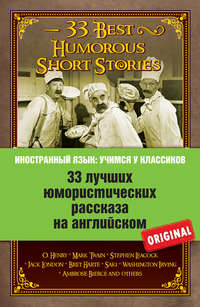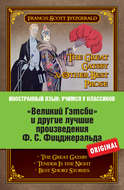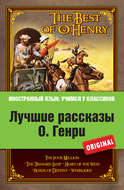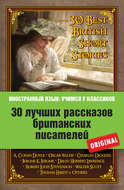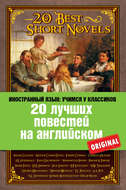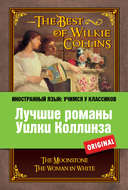Kitabı oku: «33 лучших юмористических рассказа на английском / 33 Best Humorous Short Stories», sayfa 4
I sat stunned.
‘The rest are mere corroborative details! You were again tampering with the drawer when I discovered you doing so! Do not start! The stranger that blundered into the room with a muffler on – was myself! More, I had placed a little soap on the drawer handles when I purposely left you alone. The soap was on your hand when I shook it at parting. I softly felt your pockets, when you were asleep, for further developments. I embraced you when you left – that I might feel if you had the cigar case or any other articles hidden on your body. This confirmed me in the belief that you had already disposed of it in the manner and for the purpose I have shown you. As I still believed you capable of remorse and confession, I twice allowed you to see I was on your track: once in the garb of an itinerant negro minstrel, and the second time as a workman looking in the window of the pawnshop where you pledged your booty.’
‘But,’ I burst out, ‘if you had asked the pawnbroker, you would have seen how unjust’ —
‘Fool!’ he hissed, ‘that was one of YOUR suggestions – to search the pawnshops! Do you suppose I followed any of your suggestions, the suggestions of the thief? On the contrary, they told me what to avoid.’
‘And I suppose,’ I said bitterly, ‘you have not even searched your drawer?’
‘No,’ he said calmly.
I was for the first time really vexed. I went to the nearest drawer and pulled it out sharply. It stuck as it had before, leaving a part of the drawer unopened. By working it, however, I discovered that it was impeded by some obstacle that had slipped to the upper part of the drawer, and held it firmly fast. Inserting my hand, I pulled out the impeding object. It was the missing cigar case! I turned to him with a cry of joy.
But I was appalled at his expression. A look of contempt was now added to his acute, penetrating gaze. ‘I have been mistaken,’ he said slowly; ‘I had not allowed for your weakness and cowardice! I thought too highly of you even in your guilt! But I see now why you tampered with that drawer the other night. By some inexplicable means – possibly another theft – you took the cigar case out of pawn and, like a whipped hound, restored it to me in this feeble, clumsy fashion. You thought to deceive me, Hemlock Jones! More, you thought to destroy my infallibility. Go! I give you your liberty. I shall not summon the three policemen who wait in the adjoining room – but out of my sight forever!’
As I stood once more dazed and petrified, he took me firmly by the ear and led me into the hall, closing the door behind him. This reopened presently, wide enough to permit him to thrust out my hat, overcoat, umbrella, and overshoes, and then closed against me forever!
I never saw him again. I am bound to say, however, that thereafter my business increased, I recovered much of my old practice, and a few of my patients recovered also. I became rich. I had a brougham and a house in the West End. But I often wondered, pondering on that wonderful man’s penetration and insight, if, in some lapse of consciousness, I had not really stolen his cigar case!
Miss Mix
BY CH – L – TTE BR – NTE.
Chapter I
My earliest impressions are of a huge, misshapen rock, against which the hoarse waves beat unceasingly. On this rock three pelicans are standing in a defiant attitude. A dark sky lowers in the background, while two sea-gulls and a gigantic cormorant eye with extreme disfavor the floating corpse of a drowned woman in the foreground. A few bracelets, coral necklaces, and other articles of jewelry, scattered around loosely, complete this remarkable picture.
It is one which, in some vague, unconscious way, symbolizes, to my fancy, the character of a man. I have never been able to explain exactly why. I think I must have seen the picture in some illustrated volume, when a baby, or my mother may have dreamed it before I was born.
As a child I was not handsome. When I consulted the triangular bit of looking-glass which I always carried with me, it showed a pale, sandy, and freckled face, shaded by locks like the color of seaweed when the sun strikes it in deep water. My eyes were said to be indistinctive; they were a faint, ashen gray; but above them rose – my only beauty – a high, massive, domelike forehead, with polished temples, like door-knobs of the purest porcelain.
Our family was a family of governesses. My mother had been one, and my sisters had the same occupation. Consequently, when, at the age of thirteen, my eldest sister handed me the advertisement of Mr. Rawjester, clipped from that day’s ‘Times,’ I accepted it as my destiny. Nevertheless, a mysterious presentiment of an indefinite future haunted me in my dreams that night, as I lay upon my little snow-white bed. The next morning, with two bandboxes tied up in silk handkerchiefs, and a hair trunk, I turned my back upon Minerva Cottage forever.
Chapter II
Blunderbore Hall, the seat of James Rawjester, Esq., was encompassed by dark pines and funereal hemlocks on all sides. The wind sang weirdly in the turrets and moaned through the long-drawn avenues of the park. As I approached the house I saw several mysterious figures flit before the windows, and a yell of demoniac laughter answered my summons at the
bell. While I strove to repress my gloomy forebodings, the housekeeper, a timid, scared-looking old woman, showed me into the library.
I entered, overcome with conflicting emotions. I was dressed in a narrow gown of dark serge, trimmed with black bugles. A thick green shawl was pinned across my breast. My hands were encased with black half-mittens worked with steel beads; on my feet were large pattens, originally the property of my deceased grandmother. I carried a blue cotton umbrella. As I passed before a mirror, I could not help glancing at it, nor could I disguise from myself the fact that I was not handsome.
Drawing a chair into a recess, I sat down with folded hands, calmly awaiting the arrival of my master. Once or twice a fearful yell rang through the house, or the rattling of chains, and curses uttered in a deep, manly voice, broke upon the oppressive stillness. I began to feel my soul rising with the emergency of the moment.
‘You look alarmed, miss. You don’t hear anything, my dear, do you?’ asked the housekeeper nervously.
‘Nothing whatever,’ I remarked calmly, as a terrific scream, followed by the dragging of chairs and tables in the room above, drowned for a moment my reply. It is the silence, on the contrary, which has made me foolishly nervous.’
The housekeeper looked at me approvingly, and instantly made some tea for me.
I drank seven cups; as I was beginning the eighth, I heard a crash, and the next moment a man leaped into the room through the broken window.
Chapter III
The crash startled me from my self-control. The housekeeper bent toward me and whispered: —
‘Don’t be excited. It’s Mr. Rawjester, – he prefers to come in sometimes in this way. It’s his playfulness, ha! ha! ha!’
‘I perceive,’ I said calmly. ‘It’s the unfettered impulse of a lofty soul breaking the tyrannizing bonds of custom.’ And I turned toward him.
He had never once looked at me. He stood with his back to the fire, which set off the herculean breadth of his shoulders. His face was dark and expressive; his under jaw squarely formed, and remarkably heavy. was struck with his remarkable likeness to a Gorilla.
As he absently tied the poker into hard knots with his nervous fingers, I watched him with some interest. Suddenly he turned toward me: —
‘Do you think I’m handsome, young woman?’
‘Not classically beautiful,’ I returned calmly; ‘but you have, if I may so express myself, an abstract manliness, – a sincere and wholesome barbarity which, involving as it does the naturalness —’ But I stopped, for he yawned at that moment, – an action which singularly developed the immense breadth of his lower jaw, – and I saw he had forgotten me. Presently he turned to the housekeeper: —
‘Leave us.’
The old woman withdrew with a courtesy.
Mr. Rawjester deliberately turned his back upon me and remained silent for twenty minutes. I drew my shawl the more closely around my shoulders and closed my eyes.
‘You are the governess?’ at length he said.
‘I am, sir.’
‘A creature who teaches geography, arithmetic, and the use of the globes – ha! – a wretched remnant of femininity, – a skimp pattern of girlhood with a premature flavor of tea-leaves and morality. Ugh!’
I bowed my head silently.
‘Listen to me, girl!’ he said sternly; ‘this child you have come to teach – my ward – is not legitimate. She is the offspring of my mistress, – a common harlot. Ah! Miss Mix, what do you think of me now?’
‘I admire,’ I replied calmly, ‘your sincerity. A mawkish regard for delicacy might have kept this disclosure to yourself. I only recognize in your frankness that perfect community of thought and sentiment which should exist between original natures.’
I looked up; he had already forgotten my presence, and was engaged in pulling off his boots and coat. This done, he sank down in an arm-chair before the fire, and ran the poker wearily through his hair.
I could not help pitying him.
The wind howled dismally without, and the rain beat furiously against the windows. I crept toward him and seated myself on a low stool beside his chair.
Presently he turned, without seeing me, and placed his foot absently in my lap. I affected not to notice it. But he started and looked down.
‘You here yet – Carrothead? Ah, I forgot. Do you speak French?’
‘Oui, Monsieur.’
‘Taisez-vous!’ he said sharply, with singular purity of accent. I complied. The wind moaned fearfully in the chimney, and the light burned dimly. I shuddered in spite of myself. ‘Ah, you tremble, girl!’
‘It is a fearful night.’
‘Fearful! Call you this fearful, ha! ha! ha! Look! you wretched little atom, look!’ and he dashed forward, and, leaping out of the window, stood like a statue in the pelting storm, with folded arms. He did not stay long, but in a few minutes returned by way of the hall chimney. I saw from the way that he wiped his feet on my dress that he had again forgotten my presence.
‘You are a governess. What can you teach?’ he asked, suddenly and fiercely thrusting his face in mine.
‘Manners!’ I replied, calmly.
‘Ha! teach ME!’
‘You mistake yourself,’ I said, adjusting my mittens. ‘Your manners require not the artificial restraint of society. You are radically polite; this impetuosity and ferociousness is simply the sincerity which is the basis of a proper deportment. Your instincts are moral; your better nature, I see, is religious. As St. Paul justly remarks – see chap. 6, 8, 9, and 10 —’
He seized a heavy candlestick, and threw it at me. I dodged it submissively but firmly.
‘Excuse me,’ he remarked, as his under jaw slowly relaxed. ‘Excuse me, Miss Mix – but I can’t stand St. Paul! Enough – you are engaged.’
Chapter IV
I followed the housekeeper as she led the way timidly to my room. As we passed into a dark hall in the wing, I noticed that it was closed by an iron gate with a grating. Three of the doors on the corridor were likewise grated. A strange noise, as of shuffling feet and the howling of infuriated animals, rang through the hall. Bidding the housekeeper good night, and taking the candle, I entered my bedchamber.
I took off my dress, and, putting on a yellow flannel nightgown, which I could not help feeling did not agree with my complexion, I composed myself to rest by reading Blair’s Rhetoric and Paley’s Moral Philosophy. I had just put out the light, when I heard voices in the corridor. I listened attentively. I recognized Mr. Rawjester’s stern tones.
‘Have you fed No. 1?’ he asked.
‘Yes, sir,’ said a gruff voice, apparently belonging to a domestic.
‘How’s No. 2?’
‘She’s a little off her feed, just now, but will pick up in a day or two!’
‘And No. 3?’
‘Perfectly furious, sir. Her tantrums are ungovernable.’
‘Hush!’
The voices died away, and I sank into a fitful slumber.
I dreamed that I was wandering through a tropical forest. Suddenly I saw the figure of a gorilla approaching me. As it neared me, I recognized the features of Mr. Rawjester. He held his hand to his side as if in pain. I saw that he had been wounded. He recognized me and called me by name, but at the same moment the vision changed to an Ashantee village, where, around the fire, a group of negroes were dancing and participating in some wild Obi festival. I awoke with the strain still ringing in my ears.
‘Hokee-pokee wokee fum!’
Good Heavens! could I be dreaming? I heard the voice distinctly on the floor below, and smelt something burning. I arose, with an indistinct presentiment of evil, and hastily putting some cotton in my ears and tying a towel about my head, I wrapped myself in a shawl and rushed down stairs. The door of Mr. Rawjester’s room was open. I entered.
Mr. Rawjester lay apparently in a deep slumber, from which even the clouds of smoke that came from the burning curtains of his bed could not rouse him. Around the room a large and powerful negress, scantily attired, with her head adorned with feathers, was dancing wildly, accompanying herself with bone castanets. It looked like some terrible fetich.
I did not lose my calmness. After firmly emptying the pitcher, basin, and slop-jar on the burning bed, I proceeded cautiously to the garden, and, returning with the garden-engine, I directed a small stream at Mr. Rawjester.
At my entrance the gigantic negress fled. Mr. Rawjester yawned and woke. I explained to him, as he rose dripping from the bed, the reason of my presence. He did not seem to be excited, alarmed, or discomposed. He gazed at me curiously.
‘So you risked your life to save mine, eh? you canary-colored teacher of infants.’
I blushed modestly, and drew my shawl tightly over my yellow flannel nightgown.
‘You love me, Mary Jane, – don’t deny it! This trembling shows it!’ He drew me closely toward him, and said, with his deep voice tenderly modulated: —
‘How’s her pooty tootens, – did she get her ‘ittle tootens wet, – bess her?’
I understood his allusion to my feet. I glanced down and saw that in my hurry I had put on a pair of his old india-rubbers. My feet were not small or pretty, and the addition did not add to their beauty.
‘Let me go, sir,’ I remarked quietly. ‘This is entirely improper; it sets a bad example for your child.’ And I firmly but gently extricated myself from his grasp. I approached the door. He seemed for a moment buried in deep thought.
‘You say this was a negress?’
‘Yes, sir.’
‘Humph, No. 1, I suppose?’
‘Who is Number One, sir?’
‘My FIRST,’ he remarked, with a significant and sarcastic smile. Then, relapsing into his old manner, he threw his boots at my head, and bade me begone. I withdrew calmly.
Chapter V
My pupil was a bright little girl, who spoke French with a perfect accent. Her mother had been a French ballet-dancer, which probably accounted for it. Although she was only six years old, it was easy to perceive that she had been several times in love. She once said to me: —
‘Miss Mix, did you ever have the grande passion? Did you ever feel a fluttering here?’ and she placed her hand upon her small chest, and sighed quaintly, ‘a kind of distaste for bonbons and caromels, when the world seemed as tasteless and hollow as a broken cordial drop.’
‘Then you have felt it, Nina?’ I said quietly. ‘O dear, yes. There was Buttons, – that was our page, you know, – I loved him dearly, but papa sent him away. Then there was Dick, the groom, but he laughed at me, and I suffered misery!’ and she struck a tragic French attitude. ‘There is to be company here to-morrow,’ she added, rattling on with childish naiveté, ‘and papa’s sweetheart – Blanche Marabout – is to be here. You know they say she is to be my mamma.’
What thrill was this shot through me? But I rose calmly, and, administering a slight correction to the child, left the apartment.
Blunderbore House, for the next week, was the scene of gayety and merriment. That portion of the mansion closed with a grating was walled up, and the midnight shrieks no longer troubled me.
But I felt more keenly the degradation of my situation. I was obliged to help Lady Blanche at her toilet and help her to look beautiful. For what? To captivate him? O – no, no, – but why this sudden thrill and faintness? Did he really love her? I had seen him pinch and swear at her. But I reflected that he had thrown a candlestick at my head, and my foolish heart was reassured.
It was a night of festivity, when a sudden message obliged Mr. Rawjester to leave his guests for a few hours. ‘Make yourselves merry, idiots,’ he added, under his breath, as he passed me. The door closed and he was gone.
An half-hour passed. In the midst of the dancing a shriek was heard, and out of the swaying crowd of fainting women and excited men a wild figure strode into the room. One glance showed it to be a highwayman, heavily armed, holding a pistol in each hand.
‘Let no one pass out of this room!’ he said, in a voice of thunder. ‘The house is surrounded and you cannot escape. The first one who crosses yonder threshold will be shot like a dog. Gentlemen, I’ll trouble you to approach in single file, and hand me your purses and watches.’
Finding resistance useless, the order was ungraciously obeyed.
‘Now, ladies, please to pass up your jewelry and trinkets.’
This order was still more ungraciously complied with. As Blanche handed to the bandit captain her bracelet, she endeavored to conceal a diamond necklace, the gift of Mr. Rawjester, in her bosom. But, with a demoniac grin, the powerful brute tore it from its concealment, and, administering a hearty box on the ear of the young girl, flung her aside.
It was now my turn. With a beating heart I made my way to the robber chieftain, and sank at his feet. ‘O sir, I am nothing but a poor governess, pray let me go.’
‘O ho! A governess? Give me your last month’s wages, then. Give me what you have stolen from your master!’ and he laughed fiendishly.
I gazed at him quietly, and said, in a low voice: ‘I have stolen nothing from you, Mr. Rawjester!’
‘Ah, discovered! Hush! listen, girl!’ he hissed, in a fiercer whisper, ‘utter a syllable to frustrate my plans and you die; aid me, and —’ But he was gone.
In a few moments the party, with the exception of myself, were gagged and locked in the cellar. The next moment torches were applied to the rich hangings, and the house was in flames. I felt a strong hand seize me, and bear me out in the open air and place me upon the hillside, where I could overlook the burning mansion. It was Mr. Rawjester.
‘Burn!’ he said, as he shook his fist at the flames. Then sinking on his knees before me, he said hurriedly: —
‘Mary Jane, I love you; the obstacles to our union are or will be soon removed. In yonder mansion were confined my three crazy wives. One of them, as you know, attempted to kill me! Ha! this is vengeance! But will you be mine?’
I fell, without a word, upon his neck.
Washington Irving
The Legend of Sleepy Hollow
Found among the papers of the Late Diedrich Knickerbocker
A pleasing land of drowsy head it was,
Of dreams that wave before the half-shut eye;
And of gay castles in the clouds that pass,
Forever flushing round a summer sky.
– Castle of Indolence
In the bosom of one of those spacious coves which indent the eastern shore of the Hudson, at that broad expansion of the river denominated by the ancient Dutch navigators the Tappan Zee, and where they always prudently shortened sail and implored the protection of St. Nicholas when they crossed, there lies a small market town or rural port, which by some is called Greensburgh, but which is more generally and properly known by the name of Tarry Town. This name was given, we are told, in former days, by the good housewives of the adjacent country, from the inveterate propensity of their husbands to linger about the village tavern on market days. Be that as it may, I do not vouch for the fact, but merely advert to it, for the sake of being precise and authentic. Not far from this village, perhaps about two miles, there is a little valley or rather lap of land among high hills, which is one of the quietest places in the whole world. A small brook glides through it, with just murmur enough to lull one to repose; and the occasional whistle of a quail or tapping of a woodpecker is almost the only sound that ever breaks in upon the uniform tranquillity.
I recollect that, when a stripling, my first exploit in squirrel-shooting was in a grove of tall walnut-trees that shades one side of the valley. I had wandered into it at noontime, when all nature is peculiarly quiet, and was startled by the roar of my own gun, as it broke the Sabbath stillness around and was prolonged and reverberated by the angry echoes. If ever I should wish for a retreat whither I might steal from the world and its distractions, and dream quietly away the remnant of a troubled life, I know of none more promising than this little valley.
From the listless repose of the place, and the peculiar character of its inhabitants, who are descendants from the original Dutch settlers, this sequestered glen has long been known by the name ofSleepy Hollow, and its rustic lads are called the Sleepy Hollow Boys throughout all the neighboring country. A drowsy, dreamy influence seems to hang over the land, and to pervade the very atmosphere. Some say that the place was bewitched by a High German doctor, during the early days of the settlement; others, that an old Indian chief, the prophet or wizard of his tribe, held his powwows there before the country was discovered by Master Hendrick Hudson. Certain it is, the place still continues under the sway of some witching power, that holds a spell over the minds of the good people, causing them to walk in a continual reverie. They are given to all kinds of marvellous beliefs, are subject to trances and visions, and frequently see strange sights, and hear music and voices in the air. The whole neighborhood abounds with local tales, haunted spots, and twilight superstitions; stars shoot and meteors glare oftener across the valley than in any other part of the country, and the nightmare, with her whole ninefold, seems to make it the favorite scene of her gambols.
The dominant spirit, however, that haunts this enchanted region, and seems to be commander-in-chief of all the powers of the air, is the apparition of a figure on horseback, without a head. It is said by some to be the ghost of aHessian trooper, whose head had been carried away by a cannon-ball, in some nameless battle during the Revolutionary War, and who is ever and anon seen by the country folk hurrying along in the gloom of night, as if on the wings of the wind. His haunts are not confined to the valley, but extend at times to the adjacent roads, and especially to the vicinity of a church at no great distance. Indeed, certain of the most authentic historians of those parts, who have been careful in collecting and collating the floating facts concerning this spectre, allege that the body of the trooper having been buried in the churchyard, the ghost rides forth to the scene of battle in nightly quest of his head, and that the rushing speed with which he sometimes passes along the Hollow, like a midnight blast, is owing to his being belated, and in a hurry to get back to the churchyard before daybreak.
Such is the general purport of this legendary superstition, which has furnished materials for many a wild story in that region of shadows; and the spectre is known at all the country firesides, by the name of the Headless Horseman of Sleepy Hollow.
It is remarkable that the visionary propensity I have mentioned is not confined to the native inhabitants of the valley, but is unconsciously imbibed by every one who resides there for a time. However wide awake they may have been before they entered that sleepy region, they are sure, in a little time, to inhale the witching influence of the air, and begin to grow imaginative, to dream dreams, and see apparitions.
I mention this peaceful spot with all possible laud, for it is in such little retired Dutch valleys, found here and there embosomed in the great State of New York, that population, manners, and customs remain fixed, while the great torrent of migration and improvement, which is making such incessant changes in other parts of this restless country, sweeps by them unobserved. They are like those little nooks of still water, which border a rapid stream, where we may see the straw and bubble riding quietly at anchor, or slowly revolving in their mimic harbor, undisturbed by the rush of the passing current. Though many years have elapsed since I trod the drowsy shades of Sleepy Hollow, yet I question whether I should not still find the same trees and the same families vegetating in its sheltered bosom.
In this by-place of nature there abode, in a remote period of American history, that is to say, some thirty years since, a worthy wight of the name of Ichabod Crane, who sojourned, or, as he expressed it,‘tarried,’in Sleepy Hollow, for the purpose of instructing the children of the vicinity. He was a native of Connecticut, a State which supplies the Union with pioneers for the mind as well as for the forest, and sends forth yearly its legions of frontier woodmen and country schoolmasters. The cognomen of Crane was not inapplicable to his person. He was tall, but exceedingly lank, with narrow shoulders, long arms and legs, hands that dangled a mile out of his sleeves, feet that might have served for shovels, and his whole frame most loosely hung together. His head was small, and flat at top, with huge ears, large green glassy eyes, and a long snipe nose, so that it looked like a weather-cock perched upon his spindle neck to tell which way the wind blew. To see him striding along the profile of a hill on a windy day, with his clothes bagging and fluttering about him, one might have mistaken him for the genius of famine descending upon the earth, or some scarecrow eloped from a cornfield.
His schoolhouse was a low building of one large room, rudely constructed of logs; the windows partly glazed, and partly patched with leaves of old copybooks. It was most ingeniously secured at vacant hours, by a withe twisted in the handle of the door, and stakes set against the window shutters; so that though a thief might get in with perfect ease, he would find some embarrassment in getting out, – an idea most probably borrowed by the architect, Yost Van Houten, from the mystery of an eelpot. The schoolhouse stood in a rather lonely but pleasant situation, just at the foot of a woody hill, with a brook running close by, and a formidable birch-tree growing at one end of it. From hence the low murmur of his pupils’ voices, conning over their lessons, might be heard in a drowsy summer’s day, like the hum of a beehive; interrupted now and then by the authoritative voice of the master, in the tone of menace or command, or, peradventure, by the appalling sound of the birch, as he urged some tardy loiterer along the flowery path of knowledge. Truth to say, he was a conscientious man, and ever bore in mind the golden maxim,‘Spare the rod and spoil the child.’Ichabod Crane’s scholars certainly were not spoiled.
I would not have it imagined, however, that he was one of those cruel potentates of the school who joy in the smart of their subjects; on the contrary, he administered justice with discrimination rather than severity; taking the burden off the backs of the weak, and laying it on those of the strong. Your mere puny stripling, that winced at the least flourish of the rod, was passed by with indulgence; but the claims of justice were satisfied by inflicting a double portion on some little tough wrong-headed, broad-skirted Dutch urchin, who sulked and swelled and grew dogged and sullen beneath the birch. All this he called‘doing his duty by their parents;’and he never inflicted a chastisement without following it by the assurance, so consolatory to the smarting urchin, that ‘he would remember it and thank him for it the longest day he had to live.’
When school hours were over, he was even the companion and playmate of the larger boys; and on holiday afternoons would convoy some of the smaller ones home, who happened to have pretty sisters, or good housewives for mothers, noted for the comforts of the cupboard. Indeed, it behooved him to keep on good terms with his pupils. The revenue arising from his school was small, and would have been scarcely sufficient to furnish him with daily bread, for he was a huge feeder, and, though lank, had the dilating powers of an anaconda; but to help out his maintenance, he was, according to country custom in those parts, boarded and lodged at the houses of the farmers whose children he instructed. With these he lived successively a week at a time, thus going the rounds of the neighborhood, with all his worldly effects tied up in a cotton handkerchief.
That all this might not be too onerous on the purses of his rustic patrons, who are apt to consider the costs of schooling a grievous burden, and schoolmasters as mere drones, he had various ways of rendering himself both useful and agreeable. He assisted the farmers occasionally in the lighter labors of their farms, helped to make hay, mended the fences, took the horses to water, drove the cows from pasture, and cut wood for the winter fire. He laid aside, too, all the dominant dignity and absolute sway with which he lorded it in his little empire, the school, and became wonderfully gentle and ingratiating. He found favor in the eyes of the mothers by petting the children, particularly the youngest; and like the lion bold, which whilom so magnanimously the lamb did hold, he would sit with a child on one knee, and rock a cradle with his foot for whole hours together.
In addition to his other vocations, he was the singing– master of the neighborhood, and picked up many bright shillings by instructing the young folks in psalmody. It was a matter of no little vanity to him on Sundays, to take his station in front of the church gallery, with a band of chosen singers; where, in his own mind, he completely carried away the palm from the parson. Certain it is, his voice resounded far above all the rest of the congregation; and there are peculiar quavers still to be heard in that church, and which may even be heard half a mile off, quite to the opposite side of the millpond, on a still Sunday morning, which are said to be legitimately descended from the nose of Ichabod Crane. Thus, by divers little makeshifts, in that ingenious way which is commonly denominated‘by hook and by crook,’the worthy pedagogue got on tolerably enough, and was thought, by all who understood nothing of the labor of headwork, to have a wonderfully easy life of it.
